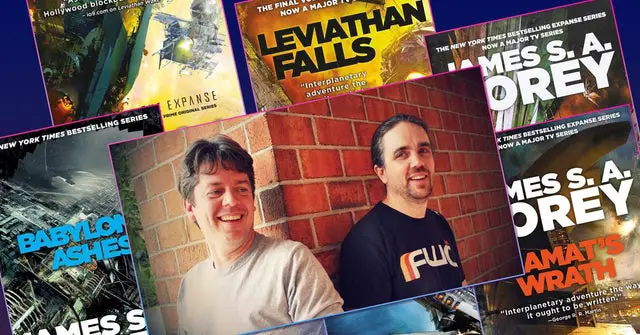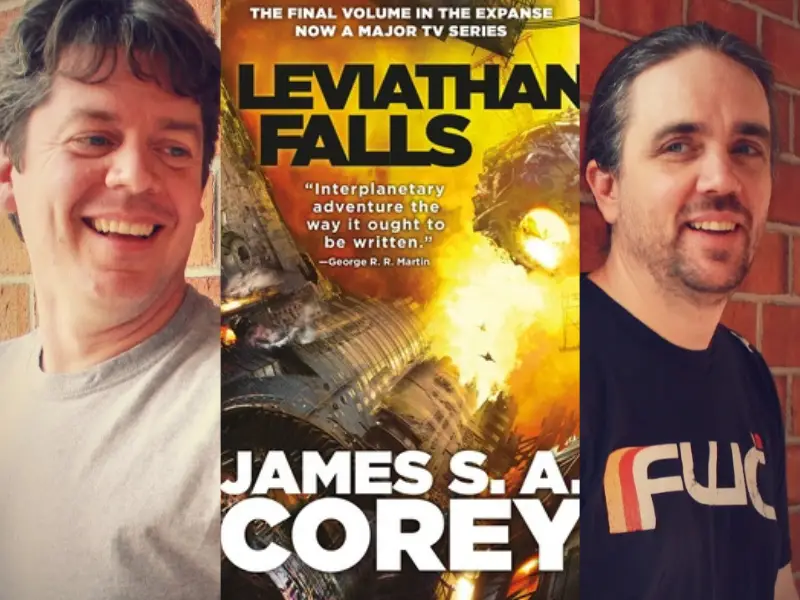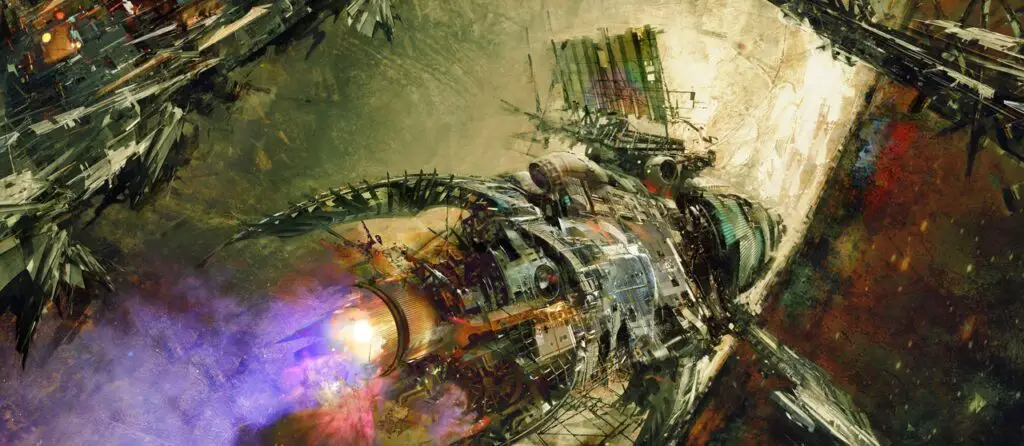As an avid science fiction reader, in 2011 I picked up a copy of James S.A. Corey’s Leviathan Wakes, a promising novel of close to 600 pages that George RR Martin called “a really kick ass space opera.” Little did I know I wasn’t just starting a new series – I was entering a long-term relationship.

Now, ten years later, the ninth and final book of the series – aptly named Leviathan Falls – has dropped, and the relationship has spun down to a graceful yet yearning end. Still, like all good relationships, it was not a solitary endeavor, but branched out into many different possibilities, many different paths to follow after the initial steps were taken.
The Core Relationship
The Expanse series follows the 4-person crew of the Rocinante, a group thrown together when their ice hauling freighter is blown to bits as an early casualty of a power grab involving an alien substance – the protomolecule – that ends up igniting a firestorm of consequences borne from not only the unknown, but also the unbalanced political structure that exists between privileged and hubristic Earth, the rising military power of Mars, and the fermenting underculture of the exploited working class Belters.
The main characters of the series – affable underachiever James Holden from Montana, bristly engineer Belter Naomi Nagata, former Martian Naval pilot Alex Kamal, and Amos Burton, the menacing yet fiercely loyal mechanic from the underbelly of Baltimore – were crewing a shuttle investigating a derelict ship when their freighter, the Canterbury, was inexplicably destroyed.
The complex and sometimes fractious development of the relationships between these four characters amidst the increasingly complex and very fractious development of the storyline is the center of this incredible nine-book series, and both the character and story development defy description and sufficient accolades in the journey we are taken on over the years. And it’s not just the main characters. There is also a myriad of other characters – some that appear in only one novel or even one chapter, some that spam multiple novels, or reappear after a long hiatus – that populate the books and expand the story to an incredible degree. The sheer diversity of the people whose lives unfold on these pages, and the way each of these divergent characters adds to our understanding – both systemically and universally – to the worlds that may be in our future, is simply remarkable.
And yet, the series has given so much more than “just” that.
Collateral Advantage
The nine books in The Expanse are magnificent. Each one, a treasure, and the sum of them all together are, in my opinion, simply the best science fiction series in the history of literature. But they have spawned more than merely nine superbly crafted books.
Along with the massive novels, there are nine (soon to be ten) novellas that take one aspect of a movement, or a landscape, or a character, and crystalizes that aspect into something sharp and beautiful. They are not necessary reading, but enhance an already well realized experience to an incredible degree. (I have one friend who insists that the novella The Churn is the best offering of the entire series.) These are not hangers-on works, they are works of art in the framework of the entire experience.
There is also the television series known as The Expanse, which debuted first on the SyFy network and then was moved to Amazon Prime Video when production values demanded more than SyFy could contribute. The series, which started at the beginning of the books, premiered after the release of the fifth novel, Nemesis Games, and from the first episode it was clear that the visual series would be just as amazing as the book series, albeit in a necessarily truncated way.
The sixth and final season of the TV series and the final novel, Leviathan Falls, appeared within two weeks of each other. At the beginning, the TV show stayed close to the source material, but of course a television show cannot encapsulate everything that is in a series of monumental novels, so major events and plot lines were softened and/or dropped in the media offering, and eventually major divergencies took place due to real world and real time limitations (including one very disappointing development involving the actor portraying a major character). But rather than suffering from the divergence, the television series became stronger as it stayed true to the heart of the story while moving towards its own endgame (as of this writing, the show is only two episodes into its final season, but the pathways will obviously be ending in very different places).
The Intangibles
But while reading this series of books is a treat in and of itself, and the TV show is wildly entertaining, there are some other intangibles that make the experience of The Expanse more than the sum of the books and television offering. For example:
While James S. A. Corey is listed as the author of the books, it’s a delight to discover that that is a pen name for two individuals – Daniel Abraham and Ty Franck, both authors in their own right. Even that name is imaginative: The “James” and “Corey” are Abraham’s and Franck’s middle names, respectively, and S. A. are the initials of Abraham’s daughter. But it doesn’t end there. How the books came about is a story in and of itself.
According to Wikipedia (I know, I know… bear with me): “The books are based on a role-playing game set up by Franck, who had developed a science fiction universe that spanned the solar system. After Franck moved to New Mexico and became part of the science fiction writing community, he set up several campaigns of the game, one that included Abraham as a player. Abraham was impressed by the amount of research and world-building Franck had done and asked to write a novel set in the game’s universe. Franck agreed and decided to split the proceeds of the book with Abraham for his part in writing from Franck’s notes and outline. After reading Abraham’s first chapters, Franck decided to become more involved with the writing. The pair collaborate(d) on the overarching plot, meeting weekly to outline chapters, with Abraham focusing on structure and prose, and Franck developing the story and world.”
I mean, how cool is that?
And Daniel Abraham has penned series of his own, also wonderful. I was especially impressed with his The Dagger and the Coin series, a high fantasy where “the coin” – finances and banking – is just as integral to winning a war (which includes a religious element that incorporates an insidious spider element) as military might – “the dagger”. It sounds bizarre – and elements of it are, indeed – but it is captivating, not only due to the originality of the story line but also to the deeply crafted and highly varied characters, not all of which are human.
But there are other intangibles built into The Expanse, such as the incredible concrete depth of the series that includes the hard science surrounding space travel and the challenges of living in different environments and different gravities, the complexities of wildly divergent economic systems and eking a living out of hostile and alien environments, all understood through the activity of the characters rather than through explication. All made understandable, all made very real. We are educated and led to empathize without realizing it.
Even the titles of the books themselves pique the intellect: not just Leviathan Wakes and Leviathan Falls, but Caliban’s War, Abaddon’s Gate, Cibola Burn, Nemesis Games, Babylon’s Ashes, Persepolis Rising, Tiamat’s Wrath. All had me heading to Google to learn more of these mentions, and marveling at how they play into understanding the action that drives their particular novels, and speak to the universality of human existence.
And Finally
Word has it that the entire nine book arc in The Expanse was plotted out from the first page, and it shows. Other multi-book series, especially those that go beyond trilogies, often seem to reach to keep the story going. They may know the ending, but the path to it is circuitous, full of extemporaneous or bloated sidebars that don’t really have anywhere to go other than to take up space. That, or else the story keeps going and keeps going, when really the meat of the tale was chewed up long ago.
Not with The Expanse. Each book gives the reader something new; satisfying on its own but built on what came before and pointing at what is to come. There are a couple of the books that lead into the next, but there are no hard cliffhangers and no tricks to keep you reading – just an arching story that intrinsically keeps you wanting more, right up until the end.
And once I read the last page of Leviathan Falls, and closed the book, it was done. The arc was complete, and whole. Yes, there was a sense of sadness that it was over, but there also was a satisfaction that it ended well. The world of The Expanse continues, but our part in it is done.
So, hat’s off to Ty Franck and Daniel Abraham. It’s been a wonderful journey, one that despite its length, I’ll probably take again. Ten years, eh? Thanks, guys, for those ten years; thanks for the experience, thanks for the journey; thanks for the story. Thanks for Holden and Naomi, for Alex and Amos, and for all those we came to know through your efforts; always, always, thanks for one helluva great story and everything else that came with it.


